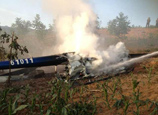
NAIROBI, June 4 (Xinhua) -- Experts from the Nairobi-based World Agroforestry Center (ICRAF) have developed a satellite technology to help better manage some of the world's richest game reserves and protected lands.
The Africa Soil Information Service (AfSIS)'s aim is to reduce the potential of human-wildlife conflicts by informing livestock herders and crop farmers where to graze and plant new crops that will increase their productivity, reduce land degradation, and reduce conflicts with wild animals.
"Livestock and farming do not have to always be in conflict with conservation efforts," Tor-Gunnar Vagen, a senior scientist at ICRAF and principal investigator for the soil health mapping component of AfSIS said in a statement received by Xinhua on Tuesday.
"Our research has implications mainly for understanding some of the underlying and often not so obvious causes of poaching - such as land tenure issues, population growth and land degradation," Vagen added.
The statement comes two months after the Kenyan government has released 156,200 U.S. dollars to Kenya Wildlife Service (KWS) to equip its elite rapid frontline response team of rangers to tackle rising human wildlife conflicts.
The money was to be used by KWS's Problem Animal Management Unit (PAMU) to purchase the rangers' tools of trade.
The experts said the research on conservation, soil and land status mapping which has been embraced by agricultural scientists and conservationists could help save Africa's rapidly declining wildlife population.
Conservationists said rising demand for ivory and rhino horn in Asia has caused a poaching crisis in recent years across Kenya in particular and Africa as a whole with over 1,000 rhinos having been killed on the continent in the last 18 months.
The poaching menace has brought renewed attention to a crisis that has persisted for decades - the steady decline of Africa's wildlife due to growing human populations and poverty that has put agricultural communities at odds with wildlife for resources.



















![]()
